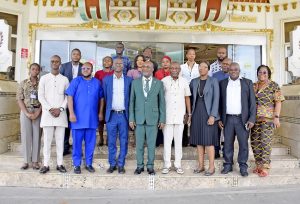The Resource and Environmental Policy Research Centre, Environment for Development (EfD) Nigeria, in collaboration with EfD Ghana, hosted a technical workshop that examined the prospects and challenges of carbon tax implementation and fuel subsidy removal in Nigeria and other African countries.

The event, which held in Abuja on Thursday, July 4, 2024, attracted key stakeholders from Nigeria’s Ministry of Budget Planning, the academia, Federal Ministry of Environment, private sector entities, civil society organisations, and representatives from the government of Ghana.
The primary focus of the workshop was to disseminate findings from a joint study conducted by EfD Nigeria and EfD Ghana on “stakeholder perspectives regarding the removal of fuel subsidies and the implementation of carbon taxes in Nigeria”.
The workshop initiative came at a time that Nigeria, through the National Council on Climate Change (NCCC), seeks to fortify its environmental policies with carbon finance mechanisms in line with the provisions of the Climate Change Act.
Speaking at the occasion, the Ag. Vice-Chancellor of the University of Nigeria, Prof. Romanus Ezeokonkwo, highlighted the workshop’s timeliness amidst global dialogues on climate change mitigation.
The Vice-Chancellor, who was represented with the Deputy Vice-Chancellor, UNEC, emphasised the necessity of practical policy measures such as carbon taxation to curtail greenhouse gas emissions.
Dr. Moses Ama, who represented the Nigerian government, expressed government’s openness and support for developing an efficient carbon taxation framework. He stressed the government’s commitment to ensuring that the initiative benefits all sectors of society, particularly focusing on strategic investments to alleviate potential adverse effects on low-income populations.
Prof. Nnaemeka Chukwuone, the Director of the Resource and Environmental Research Centre, EfD Nigeria, UNN, said that the research’s objective is to provide evidence-based advice to the Nigerian government in formulating a comprehensive carbon taxation framework.
He said that his Centre would partner with the NCCC to develop Nigerian framework on carbon market and carbon tax regime with the objective to mitigating the impact of climate change by contributing to global reduction of Greenhouse Gas emission
Speaking on the topic “Determining the optimal carbon pricing policy for Nigeria”, Prof Chukwuone said that research evidence showed that implementing production and consumption carbon taxes simultaneously would have a strong negative impact on Nigeria’s GDP and household incomes.
He advised that preference should be given to consumption carbon taxes in the short term, while production taxes can be introduced later and possibly in a gradual manner to allow the economy to absorb each round of the change.
Dr Chizoba Oranu, who presented the findings of the study on “Stakeholder perspectives regarding the removal of fuel subsidies and the implementation of carbon taxes in Nigeria”, stated that there was an overall consensus by stakeholders that Nigeria should implement carbon taxes due to its benefits in achieving the Nationally Determined Contribution (NDC) agreement and the financial incentives for sustainable energy access as well as mitigating climate change.
However, the stakeholders, according to Dr Oranu, emphasised the need for public awareness on the initiative, effective collaboration between the government and other stakeholders and implementing carbon tax only for emitters, not everyone.
Rex Asima and Daniel Lamptey, delegates from EfD Ghana, provided insights into stakeholders’ perspectives on fuel subsidy implementation in Ghana. They also addressed the challenges and opportunities associated with introducing carbon taxes in Ghana, highlighting parallels and divergences with Nigeria’s context.
Mr. Abass Ibrahim Tasunti, representing the Government of Ghana, shared Ghana’s experiences with deregulating petroleum prices, shedding light on the lessons learned and future strategies for managing economic and social impacts.
